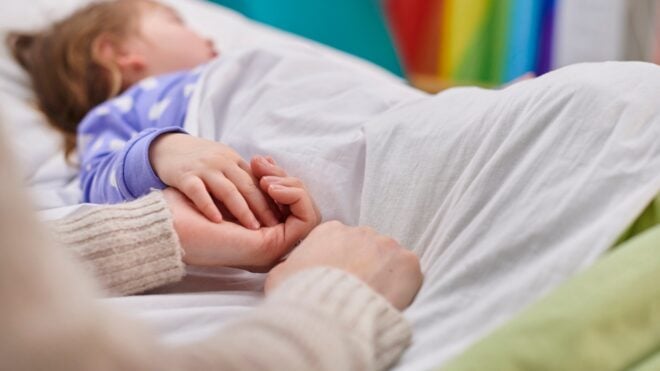
Noise

American adults just don't get enough sleep. On average, we should be snoozing at least seven hours every night. But, according to the Centers for Disease Control and Prevention, around 40 percent of us don't come close. There are lots of reasons we're not resting as much as our bodies need. Finding out the cause, and making changes, could be the key to getting more and better rest.
Noise, for example, kills a deep slumber. Whether it's a running refrigerator, drippy faucet or (ironically) a clock that ticks too loudly, or a barking dog, loud neighbors or traffic outside the house, noise keeps us from reaching a truly deep sleep.
A Partner Who Fidgets or Snores

As much as we love the closeness of sleeping together, a partner who fidgets or snores can wreck our quality of sleep, keeping us from getting the uninterrupted deep sleep that our bodies crave.
The Bedroom Is Too Hot or Cold

The optimal room temperature for sleep is between 60 and 67 degrees F. And if you can only choose between a hot and cold room, go with cold. If the room is too warm, your body can't reach the optimal temperature it needs to fall asleep.
You Have Back Problems

Back pain can keep you from fully relaxing into a deep sleep. Moreover, moving around in your sleep can trigger spasms that wake you up. If you suffer from back pain, it's important to get it treated. It's also important to make sure you're not sleeping in positions that exacerbate the pain and problems, such as on your stomach.
Screens

Small screens are now how we get most of our news, some streaming TV shows and touch base with our loved ones. They also emit a kind of blue light that mimics the sun and suppresses our ability to produce melatonin, the hormone that knocks us out at night. Putting screens away at least two hours before bedtime helps regulate natural sleep. At the very least, turn on your screen's nighttime features and keep the blue light away.
Kids

After we become parents, either habit or biology encourages us to sleep with one ear open, meaning parents often never really reach the kind of deep and sustained sleep their bodies would like. Midnight wakes-ups, or raising really early risers, also cuts into adult sleep time for years.
Your Mattress

An uncomfortable mattress can leave you feeling less than rested in the morning. Too soft, too hard, too old and squeaky. Bad mattresses can hurt your back, wake you up or otherwise wreck a good night's sleep.
Too Much Caffeine

Caffeine is great in the morning because it helps to pull you out of your slumber and sluggishness. But it has the same effect when you drink it later in the day, so it's often a reason for disruptive sleep and difficulty falling asleep. Know your body and caffeine. If you're sensitive to it, limit yourself to only pre-lunch caffeine. Find a different beverage for afternoons and evenings.
You Overeat

Poor sleep and overeating have been shown to have a strong connection. The two hormones that are released to send and receive hunger cues, ghrelin and leptin, are influenced by sleep. Ghrelin stimulates hunger, and leptin decreases it. If you don't get enough sleep, ghrelin spikes and leptin falls, leaving you hungry even during the night, which makes you restless when you should be sleeping.
Medications

While some medications cause drowsiness, others can interrupt sleep. If you've noticed that you haven't slept well since starting a new prescription, you might want to discuss it with your doctor.
Medical Problems

Any number of medical problems can cause insomnia or otherwise very poor sleep. Allergies and breathing problems, such as sleep apnea, reflux, arthritis, thyroid issues, chronic back or neck pain, and asthma can all work against our need for good sleep.
An Irregular Sleep Schedule

Irregular sleep habits have a number of negative effects, including undermining good sleep on any day. Our bodies' sleep works on a cycle that takes its cues from light, food and time spent awake. The more predictable these things are, the easier it is for our bodies to slip into sleep—and stay that way.
Light in the Room

Exposure to light during sleep affects hormone production and release, which, in turn, affects how well (and for how long) we are asleep. Limiting light exposure, including from digital clocks, cracks between blinds and the window, night lights in the room or the hallway, phones and computers, or even the red light on a fire detector, goes a long way toward getting better sleep.
Menopause

Menopause is a time of great hormonal upheaval for women, which directly affects how well they sleep. Lower amounts of progesterone and estrogen cause the body to feel differently—often too warm or restless, fatigued and yet unable to fall asleep. Others, even if they can fall asleep, experience poor-quality sleep due to insomnia, sleep apnea or snoring, which post-menopausal women commonly report.
Alcohol

A drink before bed seems as if it might help put you to sleep, but alcohol works on the brain in ways that keep you from getting quality sleep. Though studies show that you get to sleep faster and, in the beginning of your sleep cycle, more deeply, it works against REM sleep and leaves you feeling less than rested the next day.
Pets

We love our pets, sometimes even more than our partners, but they're really not great bedmates. Their sleep cycles are much shorter than ours. They have no problem waking up for a lengthy scratching session. They also like to press their bodies up against ours, have no sense of personal space and, generally, are great disruptors of sleep. Just because you get them their own bed doesn't mean you don't love them.
Stress and Anxiety

Work, family, relationship, financial and school anxiety all work against a great night's sleep. For people who can't otherwise figure out why they feel tired, even after seven-plus hours of sleep, they might want to think about what's on their minds (during the day, of course) and figure out whether it's keeping them up at night.




